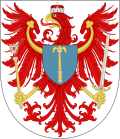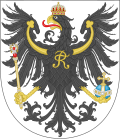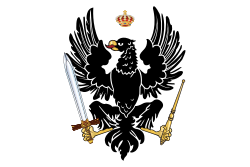
Back Koninkryk Pruise Afrikaans Königreich Preußen ALS Reino de Prusia AN مملكة بروسيا Arabic مملكة بروسيا ARZ Reinu de Prusia AST Prussiya krallığı Azerbaijani Пруссия (короллек) Bashkir Kinereich Breissn BAR Каралеўства Прусія Byelorussian
| History of Brandenburg and Prussia |
|---|
  |
|
| Present |
|
| History of Germany |
|---|
 |
| History of Poland |
|---|
 |
The Kingdom of Prussia[a] (German: Königreich Preußen, pronounced [ˈkøːnɪkʁaɪç ˈpʁɔʏsn̩] ⓘ) was a German state that existed from 1701 to 1918.[5] It played a significant role in the unification of Germany in 1871 and was a major constituent of the German Empire until its dissolution in 1918.[5] Although it took its name from the region called Prussia, it was based in the Margraviate of Brandenburg. Its capital was Berlin.[6]
The kings of Prussia were from the House of Hohenzollern. The polity of Brandenburg-Prussia, predecessor of the kingdom, became a military power under Frederick William, Elector of Brandenburg, known as "The Great Elector".[7][8][9][10] As a kingdom, Prussia continued its rise to power, especially during the reign of Frederick II "the Great".[11] Frederick the Great was instrumental in starting the Seven Years' War (1756–1763), holding his own against Austria, Russia, France and Sweden and establishing Prussia's dominant role among the German states, as well as establishing the country as a European great power through the victories of the powerful Prussian Army.[12][13] Prussia made attempts to unify all the German states (excluding the German cantons in Switzerland) under its rule, and whether Austria would be included in such a unified German domain became an ongoing question. After the Napoleonic Wars led to the creation of the German Confederation, the issue of unifying the German states caused the German revolutions of 1848–1849, with representatives from all states attempting to unify under their own constitution.[5] Attempts to create a federation remained unsuccessful and the German Confederation collapsed in 1866 when the Austro-Prussian War ensued between its two most powerful member states.
Prussia was subsequently the driving force behind establishing in 1866 the North German Confederation, transformed in 1871 into the unified German Empire and considered the earliest continual legal predecessor of today's Federal Republic of Germany.[5] The North German Confederation was seen as more of an alliance of military strength in the aftermath of the Austro-Prussian War but many of its laws were later used in the German Empire. The German Empire successfully unified all of the German states aside from Austria and Switzerland under Prussian hegemony[5] due to the defeat of Napoleon III in the Franco-Prussian War of 1870–1871. The war united all the German states against a common enemy, and with the victory came an overwhelming wave of nationalism which changed the opinions of some of those who had been against unification.
With the German Revolution of 1918–1919, the Kingdom of Prussia was transformed into the Free State of Prussia. Prussia as a whole was abolished in 1947.
- ^ E. Alvis, Robert (2005). Religion and the Rise of Nationalism: A Profile of an East-Central European City. Syracuse University Press. p. 133. ISBN 9780815630814.
- ^ Ernest John Knapton. "Revolutionary and Imperial France, 1750–1815." Scribner: 1971. Page 12.
- ^ a b "Königreich Preußen (1701–1918)" (in German). Archived from the original on 2 May 2019. Retrieved 2 May 2007.
- ^ "German Empire: administrative subdivision and municipalities, 1900 to 1910" (in German). Archived from the original on 25 December 2018. Retrieved 2 May 2007.
- ^ a b c d e Marriott, J. A. R., and Charles Grant Robertson. The Evolution of Prussia, the Making of an Empire. Rev. ed. Oxford: Clarendon Press, 1946.
- ^ "Prussia | History, Maps, & Definition". Encyclopædia Britannica. Archived from the original on 8 May 2015. Retrieved 2 November 2020.
- ^ Fueter, Eduard (1922). World history, 1815–1920. United States of America: Harcourt, Brace and Company. pp. 25–28, 36–44. ISBN 1-58477-077-5.
- ^ Danilovic, Vesna. "When the Stakes Are High—Deterrence and Conflict among Major Powers", University of Michigan Press (2002), p 27, p225–228
- ^ [1][dead link] Aping the Great Powers: Frederick the Great and the Defence of Prussia's International Position 1763–86, Pp. 286–307.
- ^ [2] The Rise of Prussia Archived 10 June 2010 at the Wayback Machine
- ^ Horn, D. B. "The Youth of Frederick the Great 1712–30." In Frederick the Great and the Rise of Prussia, 9–10. 3rd ed. London: English Universities Press, 1964.
- ^ Horn, D. B. "The Seven Years' War." In Frederick the Great and the Rise of Prussia, pp. 81–101. 3rd ed. London: English Universities Press, 1964.
- ^ Atkinson, C. T. A History of Germany, 1715–1815. New York: Barnes & Noble, 1969.
Cite error: There are <ref group=lower-alpha> tags or {{efn}} templates on this page, but the references will not show without a {{reflist|group=lower-alpha}} template or {{notelist}} template (see the help page).
© MMXXIII Rich X Search. We shall prevail. All rights reserved. Rich X Search






